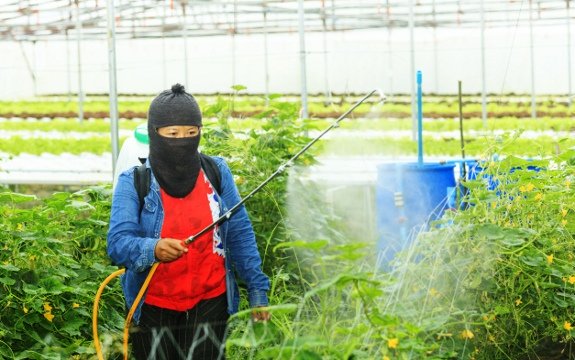RoundUp Tainting our Food: Monsanto Misleads on Glyphosate-Tainted GM Crops

 If you believed Monsanto, you would think conventionally-grown crops have higher levels of toxic glyphosate than GM varieties. Not surprisingly, you would be wrong. Despite Monsanto’s assurance that their GM crops are safe, a recent analysis in Food Chemistry revealed that not only do GM crops “take up and accumulate” dangerous pesticides during the growing season, but that Monsanto’s research to the contrary is completely misleading.
If you believed Monsanto, you would think conventionally-grown crops have higher levels of toxic glyphosate than GM varieties. Not surprisingly, you would be wrong. Despite Monsanto’s assurance that their GM crops are safe, a recent analysis in Food Chemistry revealed that not only do GM crops “take up and accumulate” dangerous pesticides during the growing season, but that Monsanto’s research to the contrary is completely misleading.
According to the researchers on that project, Thomas Bohn and Marek Cuhra, genetically modified foods contain “extreme levels” of pesticide residues, glyphosate and its principal breakdown product Aminomehtylphosponic acid (AMPA).
For the study, the researchers tested three different soybean samples for nutrients and various compounds including pesticides, glyphosate, and AMPA. Those three samples included: organic soybeans, GM soybeans, and conventional (non-GM) soybeans. None of the organic or conventional soybeans showed residues of glyphosate or AMPA. The GM soybeans, however, had residues averaging 9.0 mg/kg, an amount that surpasses many vitamins in the crop.
So how is this possible, considering Monsanto has always said pesticide contamination is worse in conventionally grown crops when compared with their Roundup-ready GM varieties? Not surprisingly, it seems the “truth” simply depends on who’s telling it.
In 1999, Monsanto said glyphosate levels in conventionally grown soybeans measured up to 16-17 mg/kg, which would be an alarmingly-high rate. But, these residues were present because of a pre-harvest pesticide spraying.
Read: Glyphosate-Ban Demanded in Brazil
Monsanto has also said that residue levels up to 5.6 mg/kg found in GM-soy are extreme and “far higher than those typically found”. In other words, they are outside the norm, according to the GM-giant. But seven of 10 of the tested GM samples in the latest study had glyphosate far higher than this “extreme level.”
It’s likely true that glyphosate contamination is actually increasing as time passes. This is because the number of glyphosate-tolerant weeds in GM-fields are increasing and so farmers are having to apply more pesticides than ever, in both higher concentrations and more frequent applications.
The toxicity of RoundUp has in part been underestimated because regulatory agencies are only testing the safety of claimed active ingredients. This despite the listed “inert” ingredients in RoundUp having disastrous consequences when combined and sprayed liberally on foods.
With the prevalence of GM foods and the use of RoundUp at alarming levels, we are only beginning to fully understand the effects. In 2012, a study indicated glyphosate’s presence in the urine of all tested men. Most recently, a study has even found that chronically sick people have even more glyphosate in their urine than healthy people.
The chemical is inside us and there is evidence it is leading to fertility problems, cancer, mental illness, and more.
